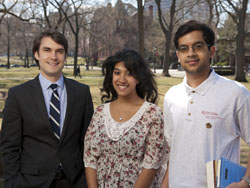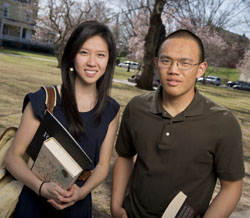Research Opportunities Expose Rutgers Students to Health Sciences Endeavors
Aresty undergraduate researchers to present their work at an April 19 symposium

“Over the years, we’ve had about 60 student projects directed by UMDNJ professors,” said Matthew Evans, director of the Aresty Research Center at Rutgers. “It’s a substantial number, and it’s made possible by faculty who have participated in the program for several years.”
These collaborations, some of which date back to the Aresty center’s debut in 2004, even offer some students the chance to supplement their laboratory work with clinical experience as their mentors apply research findings to patients who take part in clinical trials.
This year’s student research will be on display at the ninth annual Aresty Undergraduate Research Symposium on Friday, April 19. More than 450 students are planning to present their work at the event, being held in Rutgers Student Center on the College Avenue campus from 10:30 a.m. to 2 p.m. The talks and poster presentations will span the life sciences, physical sciences, engineering, social sciences and humanities.
“Not every school has a program like this,” said Sarah Hitchcock-DeGregori, a professor of pathology and laboratory medicine at the Robert Wood Johnson Medical School and an Aresty student mentor for six years. “When I think of the Aresty family’s contribution, I think it’s just about the best use of money I can imagine.”
Hitchcock-DeGregori hosts students from Aresty’s summer research program and the research assistant program, typically for second-year students. Many students continue research with her during their junior and senior years, working toward majors in molecular biology and biochemistry, neuroscience and cell biology, and genetics. But not always – she remembers one student interested in public policy who felt that research experience in her lab would be valuable for his pursuit.

“What they have in common is that they’re extremely bright, hard-working and have become engaged in research in a positive way,” she said.
As the Aresty center approaches its 10th year, it prides itself on more than the breadth of research experiences it has offered thousands of students. It now has several programs beyond the original ones that introduce students to the process of performing research.
Matthew Evans, director of the Aresty Research Center, refers to these programs as forming a research “pipeline,” beginning with a new Byrne seminar partnership that exposes freshmen to basic research techniques, followed by the original summer research and research assistant (RA) programs. Third- and fourth-year students serve as peer mentors and get financial support to do advanced research under a revamped grant program called the Aresty Undergraduate Research Fellowships. Supplementing these programs are travel grants for students presenting original research at out-of-town conferences.
“Students can start at the beginning and go straight through the pathway, or enter it at different stages,” said Evans. “But we want to make sure we have the ability to support student experiences at every stage of their time at Rutgers.”
One student who has taken advantage of several Aresty opportunities is Yuliana Noah, who is doing research with Hatem Sabaawy, a medical oncologist at the Cancer Institute of New Jersey and an assistant professor of medicine at the Robert Wood Johnson Medical School. Noah entered the Aresty research assistant program in her second year, and this year is serving as a peer instructor. Next year, she will serve as a master peer instructor. She also has an Aresty fellowship this year and will apply to renew it next year.
Noah is now studying the interaction of two genes that are commonly mutated in cancers such as leukemia, hoping that her work will help scientists develop better cancer treatments. She plans to major in cell biology and neuroscience and pursue medical school after graduation.
Chuck Keeton, an associate professor in the Department of Physics and Astronomy and faculty director of the Aresty Research Center, sees the program as an integral part of Rutgers’ vision for undergraduate education.
“There’s a lot of interest in experiential learning – hands-on experience, mentorship, personal connections between students and faculty,” he said. “The critical thinking and professional development skills that students gain while doing research are essential in the twenty-first century workplace.”
Keeton acknowledges that some Aresty students learn that research is not for them, or they try research in one field and move on to another.
“Those are valid and important experiences,” he said. “You have to learn how to learn, and research plays a valuable role in that. Classroom learning is vital. But you need to go beyond that, outside the classroom, and think ‘outside the books.’”
Following are profiles of some 2012 Aresty student projects




Media Contact: Carl Blesch
732-932-7084, ext. 616
E-mail: cblesch@ur.rutgers.edu